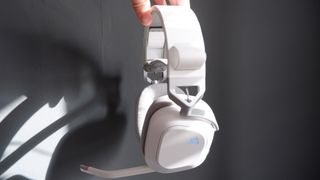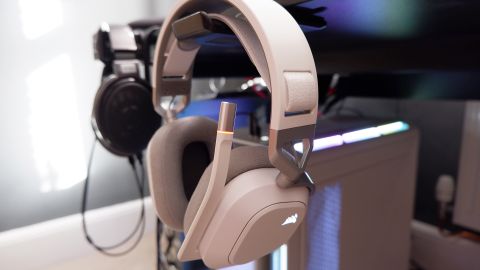Our Verdict
The Corsair HS80 Max Wireless's sound is saved by SoundID, and a well-built chassis and solid connectivity make it a good all-rounder. It's just let down by its long-term comfort and relatively high price tag.
For
- SoundID brings out the headset's best
- Great build quality
- Multiple connectivity options
Against
- Not the most comfortable over long periods
- Our favourite wireless headset is cheaper
PC Gamer's got your back
You only need one gaming headset for all your devices nowadays—the Corsair HS80 Max aims to be that headset. It's pretty similar to the Corsair HS80 RGB in looks and features, though with the inclusion of Bluetooth connectivity, the Max is better suited for multi-device life. The thing is, it's not really the sort of headset I want to wear out of the house.
Let's look at the basics of this headset first off. With 50mm neodymium drivers rated to a pedestrian 20Hz – 20kHz response, it's a fairly mid-level performer in terms of audio quality for a gaming headset on its standard flat equaliser. There's clear definition for gaming through the range, but it's nothing special out of the box.
Though there's something called SoundID built into the Corsair iCUE app that claims to tailor-make a sound profile for your ears. SoundID is an interesting prospect. You take a quiz on your sound preferences, and it mixes the equaliser according to your individual tastes to get the best set up for your ears. I went through the tests, which felt like going to the opticians but for my eyes, and received my own personal SoundID profile.
The results are surprising. It really brings out the best of this headset. My profile sounds much brighter, a little more bass-heavy, and audio really cuts through with my SoundID enabled. Admittedly pushing the pedestrian drivers in the HS80 a little too far at times, SoundID is a marked improvement on the flat preset. I'm impressed.

Connectivity: 2.4GHz, Bluetooth, USB
Driver: 50mm Neodymium
Frequency range: 20Hz – 20kHz
Microphone: Flip-to-mute, omni-directional
Weight: 352g
Warranty: 2 years
Price: $180/£170/€190/$299 AUD
The closed-back design does mean the headset has a confined audio quality about it, however, which can feel a little restrictive for longer periods of wear. This feeling of being confined isn't helped along by the headset's headband, either.
Featuring the same neat-looking strap found on many of Corsair's higher-end gaming headsets going back a couple of years, the HS80 Max is comfy enough, for a time. But after wearing the headset for half a day's work I was desperate to take it off for my lunch break. The headset wore on the tops of my ears and no amount of tinkering with the strap lengths seemed to reduce this feeling for any period of longer wear.
I felt the weight of the HS80 Max a bit more than I'd like to, though it's not a massively weighty headset overall. At 352g, the HS80 Max is only a touch over some of the best wireless gaming headsets we've looked at lately, and compared to a heavyweight like the Audeze Maxwell, it's pretty light. It's just a shame it's not quite a comfortable fit for me.
The battery life is also right up there with 65 hours claimed by Corsair over 2.4GHz or 130 hours over Bluetooth. I've only had to recharge it a couple times in the past few weeks of testing, and it wasn't fully juiced when I got it out of the box. Generally, battery life hasn't been a major concern of mine during use so far.
The HS80 Max's microphone leaves a little to be desired, however. It wasn't the most consistent-sounding mic in testing. It's plenty clear enough for gaming, and that's mostly what matters, and the adjustable flip-to-mute mic is convenient, but I wouldn't recommend it if you're looking for something to stream with. But that is often the case with wireless headphones, which can struggle to get the most out of the microphone over the cable-free connection.


✅ You already use the iCUE app: The HS80 Max uses Corsair's app for setup and operation, and it's handy having all your PC management in one spot. It's also how you access SoundID on the HS80 Max, which I really recommend trying out for yourself.
❌ You want the most comfortable headset around: The Corsair HS80 is pretty plush around the ears, but the headband can wear on your head after a full day of wearing the headset. Thankfully, it's not too heavy, which makes it a bit more bearable.
A few positives to take into account are the build quality, which is superb, and the easily navigable buttons even while it's plonked on your head. It's a nice-looking headset, too, though its gamer aesthetic and larger profile means I'm not too keen on wearing this one out of the house.
That's the thing, the Max offers Bluetooth connectivity, which should make it a great fit for travelling around hooked up to your phone or handheld PC. But there are better looking headsets for that, and the comfort just isn't there to make me want to travel long distances with the HS80 Max. With that in mind, the Bluetooth can be handy for switching between your phone and PC around the house, it's just a bit more limited than others in this emerging 'do-it-all' gaming headset category, such as the Bang & Olufsen Beoplay Portal I use regularly, or the SteelSeries Nova Pro.
There are a couple of decent goodies located in the iCUE app that make life easier, such as the integration of Nvidia's Broadcast noise cancellation feature. No doubt iCUE is a must-install alongside this headset to get the most out of it.
If you're willing to put a bit of time into running through SoundID, the Corsair HS80 Max can come into its own. Unfortunately it's those other aspects of the headset that hold it back for me: the microphone is just okay and it's not the most comfortable I've tested lately. There's also the little issue of the price. At $180, it's currently pricier than the going price of the HyperX Cloud Alpha Wireless—our favourite wireless gaming headset today. Admittedly the HyperX should be around $200, and the Corsair may end up discounted down the line, but right now I'd choose the HyperX.
The Corsair HS80 Max Wireless's sound is saved by SoundID, and a well-built chassis and solid connectivity make it a good all-rounder. It's just let down by its long-term comfort and relatively high price tag.

Jacob earned his first byline writing for his own tech blog. From there, he graduated to professionally breaking things as hardware writer at PCGamesN, and would go on to run the team as hardware editor. Since then he's joined PC Gamer's top staff as senior hardware editor, where he spends his days reporting on the latest developments in the technology and gaming industries and testing the newest PC components.

Path of Exile studio warns of 'malicious' phishing post that appeared on Steam, tells players 'please take immediate action to secure your account'

A Konami code variant in Castlevania has been discovered after a quarter of a century

Valheim's 'most challenging biome yet' is now available for public testing
